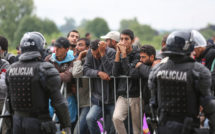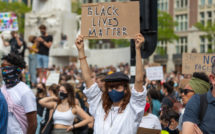

This is part of our special feature on Race and Racism in Europe: The Urgency of Now.
It’s both an exciting and worrying time in French research. On the one hand, we’ve witnessed the multiplication of high-quality work on race in social science in the last fifteen years.[1] On the other hand, in addition to the recent voting of a law degrading work conditions in all French universities, there is real reticence and even hostility towards scholarship on questions of identity, as well as on the researchers doing this work—especially when they are not white.[2] Conducting research as a tenured faculty member in American Studies is both simpler and more complicated. It is simpler because, as scholars of the United States, we are more often asked to talk about “race” and “racism” as US—certainly not French realities. But we are also often accused of “importing concepts” that do not make sense in the French context, of “Americanizing” the debate, of crushing national realities, of disregarding French research and local dynamics on the subject, even when one is cautious enough to conduct theoretically and empirically-informed comparative work or trace transatlantic circulation (and, subsequently national appropriations) of ideas, repertoires, or concepts. In France, academic work on race is too often discredited “a priori.”[3] Such studies are the object of controversies based on denial and disqualification.
A month before my doctoral thesis was published as an academic book, I published another intervention entitled Une famille française: Des Antilles à Dunkerque en passant par l’Algérie[4]. In both books, I made the choice to take seriously what people say about who they are, to grasp where their narratives come from and to examine the discursive influence of their lived experience and individual trajectories. To understand these dynamics in the framework of the French academic world is a balancing act of analyzing, asking questions, and questioning the questions. Between my desire to take seriously the suffering, commitments, and emotions, as well as the imperative to analyze and generalize, the tension was quite strong. How can we, as scholars, do any of this without exposing ourselves? How do we grasp the importance of fictions and the stories that we tell each other without lying to ourselves? How can and should we exercise much-needed reflexivity?
Growing up in Martinique, before going to France[5] like thousands of others to study, informs the way I view contemporary debates on racism and the recurring attacks against anti-racism. Faced with the violence of these attacks, despite differences over how to respond or rather how to deal with racism, I therefore proposed Une famille francaise as a work that would be informed both by my scholarly and my literary aspirations (for it is in literary or film works that I find the best materialization of all these issues). Animated by a willingness to disseminate scholarly findings on these questions while intervening further in the public debate, I wrote Une famille française considering a key question: For whom am I writing? For my colleagues or potential reviewers? Without having too many illusions about the role of social sciences in effecting social and political change, the writing of the book was nevertheless guided by a desire to reach people interested in these issues: parents, children for whom these stories would echo. I wanted to write for people who may be far from activist networks and academic work, but who are also looking for “miraculous weapons”—as Césaire would say—in a French context where they too often feel like stowaways.
Asked to write a book that would be like a French version of Ta-Nehisi Coates’ Between the World and Me[6] I transformed this commission into the culmination of a personal project that would combine social sciences, attention to embodiment, reflexivity, and a statement on the place of racialization (among other dynamics) in the history of a French family over a century. While, to many, the title sounded like a form of provocation, I sought to make the narratives of migration, exile, and race the ordinary story of a French family. In my personal narrative, there are trips and journeys between Dunkirk, Fort-de-France, Marie-Galante, Pointe à Pitre, and the United States. There is an order in which the stories are told and interwoven paths that illustrate something important.
My mission with Une famille française was to research over a century of family genealogy and illustrate how individual narratives and history meet. I tell the story of a family—that of my two daughters, their parents, grandparents, and great-grandparents. Deployed from the early 1930s to the end of 2010, these stories tell the destinies of men and women, some of whom know each other and others who have never met, but who are all ancestors of my two children. Their stories are diverse, taking place, for the most part, on three continents (Europe, Africa, North America), and are traversed by war, exile, migration, social ascension, and economic failures and hardships. These are the stories of individuals who were born French or who have become French and who all have a direct or indirect link with the French colonial empire. Through these multiple narratives, the book explores the role of colonial legacies in the lives of ordinary French people in the twentieth and twenty-first centuries. It also tells the variety and changing relations to being French. Finally, it shows the wide variety of apprehensions about otherness, racialization for individuals who are not all politicized or even interested in these issues.
The story thus begins in the 1930s and with the experience of war in childhood (a common experience for men and women living in Martinique, Dunkirk, Marie-Galante, Alicante, Algeria, or Toulon). Their childhood is marked by war—the Vichy regime deployed in the colonial world. A few years later, as the children became adults, another important and common experience is that of access to healthy housing, to a “HLM” (Habitat à Loyer Modéré) for working-class families in the north or south of France or in Martinique. Dunkirk, a World War II martyr city, Fort-de-France, whose center was built on swamps and had no sewerage system worthy of the name before the action of Mayor Aimé Césaire. Here and there, young girls are ashamed of being poor, appreciative to have running water and a corner of their own in a slightly larger, more functional apartment. But not all experiences are common, and not all members of this family experience minority status or racialization. Some experience racial assignment in their flesh, while their country lives in the comfortable illusion of color-blindness, even though so many dimensions of life, quests, reflexes, and feelings about identity are conditioned by race. With advances and setbacks, despite the passage of generations, racial assignment and categorization continues to operate for children and then grandchildren, drawing racial boundaries within families.
The period of the 1960s provides an opportunity to narrate the way in which the relationship between school and upward social mobility in these families is addressed. Education gives hope for success, but it’s also where a black or “Métis” person receives racist slurs and insults from students and teachers alike… For people from Martinique and Guadeloupe, hoping for upward mobility often means crossing the ocean in order to continue one’s life in mainland France, “là-bas.” The former colonies of the Americas did not become independent. They became departments, theoretically subject to the same laws as the metropole. This was an original way out of the colonial status that should have granted full equality of rights for the inhabitants of these territories. Hopes were quickly disappointed and soon, state-sponsored migration to the metropole seemed to be one of the only paths of salvation for Martinicans and Guadeloupeans, as well as Reunion Islanders. The migration has been massive and many are those who join the Caribbean presence in the hexagon.
The 1980s were the years of return for some—those in my family in, any case. And I realize today how growing up during this period was a kind of blessing for me. Martinique at that time offered a panoply of weapons to fight against racism and essentialization. The Martinique of the 1980s is that of cultural pride and Negritude, which was established as a cultural policy thanks to the SERMAC[7] programs of the city of Fort-de-France. The way of thinking about my place in the world and in society was transformed and I had a little less illusion about the false promise of equality, freedom, and fraternity when I migrated to mainland in France as a student.
When you are from Martinique, you are kind of obliged to engage with Césaire, Fanon and Glissant. While I find a little of myself in all three of these figures, for me, it is rather Damas that speaks of suffering, not of being a negro, but of being a “mulatto” petit bourgeois who is prevented from “acting like a negro” because it is not to be done. It is the great social distance that often, but not always, takes on the costume of phenotype, the texture of the hair, more often, ways of being and behaving.
It is perhaps that my identity lacks authenticity: not “mûlatre” enough for Martinique, but above all not rich and bourgeois enough to be in the local dominant classes, not enough Creole-speaking to really belong to the local popular classes. A multiplicity of social positions and identities, typical of these urban families from the French overseas territories: those who are not familiar with local plants to take care of themselves, did not know how to work the land, had no other baggage than the “choice” at thirteen, fourteen, or fifteen years of age to leave their mother to go “over there” in mainland France.
It is this multi-positionality that constituted my first introduction to the problem of identity in post-colonial Martinique.
Yet, having grown up in Martinique in the 1990s, my first “reflective” relation to all this came out of irritation at what I perceived as an interest solely in identity and traditions in local politics, at a time when a crack epidemic and social inequalities were ravaging the island. The educational system seemed to me to be a battlefield with language and accent as weapons on both sides. Against the weapons of the dominant in a dominated country, words were appropriated as a form of linguistic resistance.
Familial intimacy is perhaps political. But how do we transpose the tremors of the soul linked to asking ourselves not so much who we are, but more, “Why do we think of ourselves this way? Here?” to the analysis of collective and political mobilizations?[8] How can we reconcile taking seriously the content that each of us gives to our “identity” while at the same time having a strong awareness—as a social scientist, as a woman, as a Martinican, as a Black woman, as a Parisian, as a Sciences Po alumnus, as a professor at a northern French university, as a mother—of the contingency not only of this content but of the way to express it? How can one lay oneself bare while being legitimate in academia? “Be a social movement scholar, don’t be the sociologist of the French Caribbean population,” I was once advised… “It’s an exotic subject,” I was told. At the end of the day, while I do think it matters to know the writer’s position, I am also aware it comes at greater risk for non-white scholars in France.
In recent years, it is in literature that I have found the most satisfying and accurate descriptions of everything I try to analyze in my research. At least, a more literary style of writing allowed me to respond to the limitations I saw in social science. Americanah by Chimamanda Ngozi Adichie[9] offers a dive into the subtlety of ethnic and racial identities in what they convey of proximity and distance, of irritation and recognition of a gesture, a word, a posture. Likewise, in a series of video films by Cecile Emeke, two French, Caribbean and African women evoke what it means for them to be Black in France and review, in a Londonian English accent, things that are rarely brought together, said and expressed as such—the diversity, the feeling of being “mixed” and the “micro-aggressions” that one ends up getting used to. They express a difficulty in defining identity precisely because it is multiple and contingent. At the same time, they express the will to be simply taken for what they are, which is not necessarily fixed. Their narratives and self-concepts go in all directions, they are simultaneously cultivated and confused, and their discourse on identity is full of contradictions. However, we find in these two young women, as in the novels of Adichie, what is often sorely lacking in social science work on these issues: the whole range of daily accommodations for continuing to live, to love each other, and to argue and struggle in spite of racialization and racism. It is key to understand, as carefully as possible, what identity is not and to grasp the complexity of what it is. A sense of daily negotiations must be cultivated.
And these permanent negotiations to ascribe meaning to what one “is” and what “others” are remain invisible if one insists on being part of an alternative between “communitarianism” and abstract universalism. In France, the term “communautarisme” is a fuzzy notion with pejorative connotations that serves to delegitimize practices and claims by religious or ethnic groups or anti-racist mobilizations. Individuals, organizations, ethnic groups are thus designated as threatening to the “republican order.”[10] Letting ourselves be trapped in this very French alternative limits our ability to truly think about race and racism and how they relate to the ways in which the French of today define the boundaries of their identities.
In a text on the “dilemmas of autonomy,”[11] sociologist Abdellali Hajjat wonders about how to “invent new souls,” the transition between “imposed terrain” (racial and identity assignments) and “invented terrain after Césaire.” The author notes that inventing and reinventing these new terrains is a heavy and complicated task and a work to be deployed in a French context that is particularly hostile today. But it is necessary to carry out this work while always refusing essentialism, even when it is temporary or punctual. It is necessary to always refuse to act like the reactionaries who apply themselves, day after day, to denying the complexity of who we—contemporary French people—are and what we live.
Audrey Célestine is a political sociologist and an associate professor in American studies at the University of Lille. She is the author of three books: La fabrique des identités. L’encadrement politique des minorités caribéennes à Paris et New York (2018 Karthala), Une famille française. Des Antilles à Dunkerque en passant par l’Algérie (2018, Textuel) and Des vies de Combats. Femmes, noires et libres (L’Iconoclaste, 2020). Her works focuses on the articulation between identity, race and politics in France, Martinique and the United States.
References:
[1] Hajjat, Abdellali. 2019 “Obstacles et avancées de la recherche sur la question raciale en France.” 2019. H-France, Salon Vol. 11, 2, n°4. https://h-france.net/Salon/SalonVol11no2.4.Hajjat.pdf
A new science blog on racism has been launched by leading scholars on the issue : https://racismes.hypotheses.org/
[2] In addition to the preceding Hajjat reference, see Célestine, Audrey., Hajjat Abdellali and Lionel Zevounou,. 2019. “Rôle des intellectuels, universitaires « minoritaires » et des portes-paroles des minorités.” 2019. Mouvements, February 12th, 2019. https://mouvements.info/role-des-intellectuel%c2%b7les-minoritaires/
[3] Belkacem, Lila; Direnberger, Lucia; Hammou, Karim and Zacharias Zoubir. “Prendre au sérieux les recherches sur les rapports sociaux de race.” 2019. Mouvements, February 12th 2019. https://mouvements.info/prendre-au-serieux-les-recherches-sur-les-rapports-sociaux-de-race/
[4] A French Family: From the Antilles to Dunkirk, By Way of Algeria
[5] Most people in Martinique mean “mainland France” when they say “France”.
[6] It is to be noted that the title was translated as Une colère noire—Black anger. Confronting race “head-on” seems to be much easier when dealing with the U.S.
[7] The municipal cultural center launched by Césaire in Fort-de-France in the early 1970s. See Defontaine, Chantal. “L’heure de nous-même a sonné.” May 1st 2020, YouTube. https://www.youtube.com/watch?v=pleLlmseZLk&t=443s
[8] Célestine, Audrey. 2019. La fabrique des identités. L’encadrement politique des minorités caribéennes à Paris et New York. Paris: Karthala..
[9] Adichie, Chimamanda Ngozi. 2014. Americanah. Oslo: Gyldendal A/S.
[10] Mohammed, Marwan and Julien Talpin, eds. 2018. Communautarisme? Paris: PUF/Vie des idées.
[11] Hajjat, Abdellali. “Les dilemmes de l’autonomie : assimilation, indigénisme et libération.” Quartiers XXI, October 7th 2015. https://quartiersxxi.org/les-dilemmes-de-l-autonomie-assimilation-indigenisme-et-liberation/
Published on December 8, 2020.




